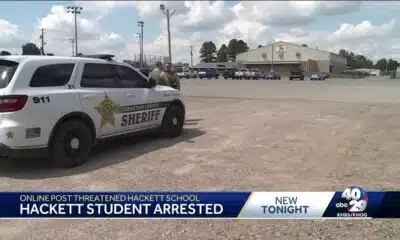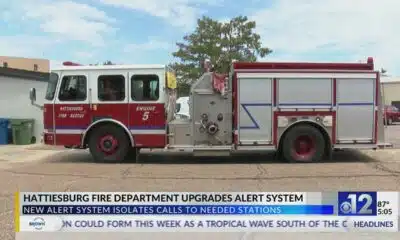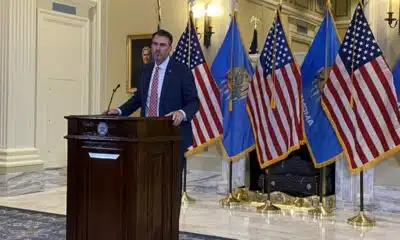Mississippi Today
In Jackson’s ‘white Republican bastion,’ population changes shape council race
Jasmine Barnes has been following the headlines about dysfunction in Jackson’s City Hall since college, taking notes on government meeting minutes and financial records.
The auditor at the Mississippi Department of Transportation had wanted to run for city council for years, but she started seriously considering it after purchasing her first family home in Northpointe, a northeast Jackson neighborhood, in 2019.
It seemed to her like the city could use her accounting expertise, but she was uncertain if a young Black woman could be a viable candidate in Ward 1, an area long known as Jackson’s “white Republican bastion.”
“I knew that if you’re gonna run against a white Republican in a ward like this, you’re gonna have to have your A-game,” she said.
In an attempt to convince Barnes, her campaign manager and friend sent out a poll in late December, asking frequent voters in the ward if they were satisfied with the incumbent Ashby Foote, the founder of a financial services company who was elected to the council in 2014 as a Republican and has not faced a serious challenger since.
Over half of respondents said they would consider somebody else, Barnes said.
Now, as Ward 1 residents start voting for the June 3 general election, Barnes and fellow challenger, independent Grace Greene, are creating stiff competition for Foote who is also running as an independent.
The hotly contested race reflects what political observers and ward residents have known for years now: Northeast Jackson is not quite the “white Republican bastion” it once was.
In 2024, Ward 1 was recorded as having 1,000 more Black residents than white, a ratio of nearly 50% to 45%, after redistricting prompted by the 2020 census. That same year, the ward voted overwhelmingly for Kamala Harris over Donald Trump during the presidential election.
To be sure, Ward 1 is still the city’s whitest ward, home to influential Republican donors who live in some of the most exclusive neighborhoods in the state. And these voters carry greater weight in municipal races, where turnout is lower, a trend that historically favors the affluent and conservative. In this year’s Democratic primary, Ward 1 recorded the highest voter turnout in the city – 30% versus 23% citywide – leading some pundits to cry Republican interference.
Jackson’s demographics by U.S. Census block group
Hover over each dot to learn more.
Ward 1 is economically diverse, with some of Jackson’s biggest mansions as well as several apartment complexes.
But many of the ward’s civically engaged residents, regardless of race, political party or the nexis of the two, are united by shared interests, such as preserving property values in an area that has not suffered as much as other parts of the city from population loss, crime or divestment but where there is financially more at stake.
“I’m gonna go back to: We need help,” Madeline Cannon, a Ward 1 resident for nearly 60 years, said as she was leaving a candidate forum at the Briarwood Presbyterian Church last week. “Right now, I’m looking for a leader. I am a Democrat. I’ve been a Democrat all my life. But we’re just looking for a leader.”
For residents, their relationships with their council person matters much more, Cannon said, than political party.
Greene said she recently experienced this firsthand at a meet-and-greet at the Country Club of Jackson hosted by a friend who is involved with the neighborhood association. Greene was prepared for residents to ask her questions about Rodney DePriest, a white businessman who is running as an independent candidate for mayor.
Instead, Greene said nearly everyone wanted to know if she knew Horhn, who had just secured the Democratic nomination.
“Then some of the people who were coming up to me, introducing themselves to me were like, ‘We’ve already spoken to John Horhn about this, we’re doing this … or we worked with John for years about this or he’s been supportive about this in the Senate, whatever business or philanthropic thing these people had worked on, and it was very obvious they had good relationships with him and a respect for him,” she said, “and like, in their minds, it was almost settled, even though we had a general election.”
When Jackson adopted a mayor-council form of government and created the city’s seven wards 40 years ago, Ward 1 voters elected a Democrat. But ever since 1993, when insurance agency president Derwood Boyles stepped down, Ward 1 has been represented by a Republican.
Political scientist Steve Rozman, a retired Tougaloo College professor who lived in north Jackson for years, has a few possible explanations for why northeast Jackson became and has remained the whitest, wealthiest and most conservative part of the city.
Jackson was developed as a segregated city, and Rozman speculated the city’s desirable land was close to the Pearl River. Indeed, one of Jackson’s most premier neighborhoods, Eastover, was developed in 1949 by Leland Speed Sr., a former mayor of Jackson, on a horse farm on low-lying land near the river.
“Whites set up on the land that they regarded as best in the area,” he said. “A lot of the Black neighborhoods historically have not been near the Pearl River. With the municipal water system, maybe it was advantageous under more primitive conditions to be near water.”
As the 20th century wore on, factors like redlining, higher property values and significant opposition from racist white people would have kept Black Jacksonians from purchasing homes in the city’s northeast until the 1990s and 2000s, Rozman said.
Today, northeast Jackson is home to large apartment complexes near County Line Road and I-55 as well as a growing Hispanic population, a diversity that Barnes said people don’t often acknowledge. Instead, folks still tend to associate northeast Jackson with its tennis courts, private schools and gated neighborhoods.
“I don’t know if it’s like a perception thing,” she said.
In reality, the ward’s demographics represent a marked shift from 1992, when Ward 1 was 92% white, according to the Northside Sun.
Back then, Ward 1 was one of three majority white wards in the city, along with wards 4 and 6 in southwestern Jackson. But by 2000, before the city had even received the final Census tally, Ward 1’s councilperson, Ben Allen, was telling his constituents that would no longer be possible.
“It would be very difficult for us to get three white wards, unless some fancy gerrymandering goes on,” Allen told the Northside Sun.
Come 2002, redistricting dropped Ward 1’s white population to 76%, according to newspaper archives. The balance would shift again in 2010, to 55.9% white and 39.7% Black.
With the exception of a few closely contested special elections, the ward has remained a Republican stronghold this century, as Democrats often failed to field any candidates. But when they did, the race could be close: In 2014, Foote was elected by a little over 100 votes against construction attorney Dorsey Carson. It was technically a nonpartisan special election, and Carson, a Democrat, reportedly “strayed from discussing his political affiliation,” while Foote emphasized his conservative values.
Now the sole Republican on the council, Foote said when it came time for him to participate in drawing new ward lines last year, he didn’t do so with his reelection chances in mind in part because the process did not affect his constituency’s racial balance.
Of the couple thousand voters that Ward 1 had to give up, Foote said they were about 50-50 Black-white.
Instead, Foote said his goal was to keep the shape and cohesiveness of Ward 1 “in a way that made logical sense and not get gerrymandered into something that looks like a lizard or whatever.”

The distant cousin of author Shelby Foote moved to Jackson in 1980. In 1999, he bought a home with his wife on Calnita Place, close to Jackson Academy — a feature Foote said he didn’t appreciate at the time because his children attended other schools, but has since come to see as protecting his property values.
Plus, the cul de sac was good for his dog, Skip, a Jack Russell mix.
“Your dog’s life expectancy goes up,” Foote said jokingly.
As she has canvassed the ward, Barnes said she’s loved walking through the neighborhoods close to Jackson Academy.
“I was like, man, this is a really cool community, and I just kind of love that aspect of kids walking by themselves because they feel safe enough to do that,” she said.
That’s not the only similarity between Democrat and Republican in the Ward 1 race. When Barnes reads news articles about the city, she often ends up finding herself asking the same questions as Foote about financial transparency and accountability.
“Jackson is in a vulnerable position, but we’re not a vulnerable city,” she said. “We have a lot that we can do internally to build our credibility, build our leverage first, and then we can go out and seek other resources.”
Foote noted that if he were to lose reelection, the lack of a Republican on Jackson’s city council would not impact the issues of the day.
“It’s not really about Republican values or Democrat values,” he said. “It’s really about let’s get the roads fixed, let’s make sure we have running water, let’s make sure the garbage is picked up, and let’s make sure we do it in a cost efficient manner.”
At the same time, Foote has touted in campaign materials that he is endorsed by the Hinds County Republican Party. He said his first run for office was financed by a generous donation from Billy Mounger, an architect of the state’s GOP who was good friends with Foote’s father.
Greene, an entrepreneur who has worked as a doula, an online reseller, and an economic developer in Peru, said she chose to run as an independent so that residents of Ward 1, regardless of their political affiliation, will know she supports them.
Greene moved to the ward in 2020 with her family after looking at homes in Belhaven, Fondren and LOHO, the neighborhood just outside of Eastover. They landed on a home in Heatherwood in part because it had an attached garage, a feature the older homes in Fondren lack.

Plus, she wanted to raise her kids, who are enrolled in Jackson Public Schools, in a diverse environment, a decision she has talked about with other white residents during the campaign.
“There was somebody in the neighborhood who knew me from childhood and he made a comment about the changing demographics of the neighborhood. He said how initially he thought it was going to be a negative thing, but it just turned out to not be a negative thing. I just told him, I said, ‘Well that was a positive to us when we moved here,’” she said during an interview at her office in Highland Village.
Greene also noted that everyone in the ward is impacted by the city’s actions, regardless of whether they live in an apartment or a gated community. For instance, she said she had two kids in diapers with no trash pick up for 18 days in 2023.
“That was a leveler across the city, cause no matter where you lived, no one had trash pickup, and we all had to figure out what to do with this,” she said. “And the fact that there was truly, really no explanation to the citizens as to why this was happening? There was no response when we reached out about it.”
Another leveler? When it’s the state versus Jackson, that includes the Republicans who live here, too.
Foote shared a story about the controversy surrounding the Smith-Wills Stadium. At one point, frustrated by what he characterized as a lack of transparency from the city administration around a deal to forgive $500,000 in past-due rent from the stadium’s vendor, Foote said he asked Attorney General Lynn Fitch’s office for an opinion on whether the vote the council took to do so was legal.
Even though Fitch is a fellow Republican, Foote said her office told him it would be a conflict of interest to opine on his question, since Fitch is representing the state in its fight to take the stadium.
This article first appeared on Mississippi Today and is republished here under a Creative Commons Attribution-NoDerivatives 4.0 International License.
The post In Jackson’s 'white Republican bastion,' population changes shape council race appeared first on mississippitoday.org
Note: The following A.I. based commentary is not part of the original article, reproduced above, but is offered in the hopes that it will promote greater media literacy and critical thinking, by making any potential bias more visible to the reader –Staff Editor.
Political Bias Rating: Center-Left
This article presents a primarily factual report on the evolving political and demographic landscape of Jackson’s Ward 1 council race. It highlights the shifting racial makeup and political affiliations without overtly endorsing any candidate or ideology. The framing, however, subtly emphasizes the significance of demographic changes and increasing Black voter presence, which often aligns with a center-left perspective focusing on representation and equity. The tone remains balanced by including voices across the political spectrum and stressing practical governance issues over partisan divides. Overall, the coverage leans slightly center-left through its attention to diversity and community impact.
Mississippi Today
Presidents are taking longer to declare major natural disasters. For some, the wait is agonizing
TYLERTOWN — As an ominous storm approached Buddy Anthony’s one-story brick home, he took shelter in his new Ford F-250 pickup parked under a nearby carport.
Seconds later, a tornado tore apart Anthony’s home and damaged the truck while lifting it partly in the air. Anthony emerged unhurt. But he had to replace his vehicle with a used truck that became his home while waiting for President Donald Trump to issue a major disaster declaration so that federal money would be freed for individuals reeling from loss. That took weeks.
“You wake up in the truck and look out the windshield and see nothing. That’s hard. That’s hard to swallow,” Anthony said.
Disaster survivors are having to wait longer to get aid from the federal government, according to a new Associated Press analysis of decades of data. On average, it took less than two weeks for a governor’s request for a presidential disaster declaration to be granted in the 1990s and early 2000s. That rose to about three weeks during the past decade under presidents from both major parties. It’s taking more than a month, on average, during Trump’s current term, the AP found.
The delays mean individuals must wait to receive federal aid for daily living expenses, temporary lodging and home repairs. Delays in disaster declarations also can hamper recovery efforts by local officials uncertain whether they will receive federal reimbursement for cleaning up debris and rebuilding infrastructure. The AP collaborated with Mississippi Today and Mississippi Free Press on the effects of these delays for this report.
“The message that I get in the delay, particularly for the individual assistance, is that the federal government has turned its back on its own people,” said Bob Griffin, dean of the College of Emergency Preparedness, Homeland Security and Cybersecurity at the University at Albany in New York. “It’s a fundamental shift in the position of this country.”
The wait for disaster aid has grown as Trump remakes government
The Federal Emergency Management Agency often consults immediately with communities to coordinate their initial disaster response. But direct payments to individuals, nonprofits and local governments must wait for a major disaster declaration from the president, who first must receive a request from a state, territory or tribe. Major disaster declarations are intended only for the most damaging events that are beyond the resources of states and local governments.
Trump has approved more than two dozen major disaster declarations since taking office in January, with an average wait of almost 34 days after a request. That ranged from a one-day turnaround after July’s deadly flash flooding in Texas to a 67-day wait after a request for aid because of a Michigan ice storm. The average wait is up from a 24-day delay during his first term and is nearly four times as long as the average for former Republican President George H.W. Bush, whose term from 1989-1993 coincided with the implementation of a new federal law setting parameters for disaster determinations.
The delays have grown over time, regardless of the party in power. Former Democratic President Joe Biden, in his last year in office, averaged 26 days to declare major disasters — longer than any year under former Democratic President Barack Obama.

FEMA did not respond to the AP’s questions about what factors are contributing to the trend.
Others familiar with FEMA noted that its process for assessing and documenting natural disasters has become more complex over time. Disasters have also become more frequent and intense because of climate change, which is mostly caused by the burning of fuels such as gas, coal and oil.
The wait for disaster declarations has spiked as Trump’s administration undertakes an ambitious makeover of the federal government that has shed thousands of workers and reexamined the role of FEMA. A recently published letter from current and former FEMA employees warned the cuts could become debilitating if faced with a large-enough disaster. The letter also lamented that the Trump administration has stopped maintaining or removed long-term planning tools focused on extreme weather and disasters.
Shortly after taking office, Trump floated the idea of “getting rid” of FEMA, asserting: “It’s very bureaucratic, and it’s very slow.”
FEMA’s acting chief suggested more recently that states should shoulder more responsibility for disaster recovery, though FEMA thus far has continued to cover three-fourths of the costs of public assistance to local governments, as required under federal law. FEMA pays the full cost of its individual assistance.
Former FEMA Administrator Pete Gaynor, who served during Trump’s first term, said the delay in issuing major disaster declarations likely is related to a renewed focus on making sure the federal government isn’t paying for things state and local governments could handle.
“I think they’re probably giving those requests more scrutiny,” Gaynor said. “And I think it’s probably the right thing to do, because I think the (disaster) declaration process has become the ‘easy button’ for states.”
The Associated Press on Monday received a statement from White House spokeswoman Abigail Jackson in response to a question about why it is taking longer to issue major natural disaster declarations:
“President Trump provides a more thorough review of disaster declaration requests than any Administration has before him. Gone are the days of rubber stamping FEMA recommendations – that’s not a bug, that’s a feature. Under prior Administrations, FEMA’s outsized role created a bloated bureaucracy that disincentivized state investment in their own resilience. President Trump is committed to right-sizing the Federal government while empowering state and local governments by enabling them to better understand, plan for, and ultimately address the needs of their citizens. The Trump Administration has expeditiously provided assistance to disasters while ensuring taxpayer dollars are spent wisely to supplement state actions, not replace them.”

In Mississippi, frustration festered during wait for aid
The tornado that struck Anthony’s home in rural Tylertown on March 15 packed winds up to 140 mph. It was part of a powerful system that wrecked homes, businesses and lives across multiple states.
Mississippi’s governor requested a federal disaster declaration on April 1. Trump granted that request 50 days later, on May 21, while approving aid for both individuals and public entities.
On that same day, Trump also approved eight other major disaster declarations for storms, floods or fires in seven other states. In most cases, more than a month had passed since the request and about two months since the date of those disasters.
If a presidential declaration and federal money had come sooner, Anthony said he wouldn’t have needed to spend weeks sleeping in a truck before he could afford to rent the trailer where he is now living. His house was uninsured, Anthony said, and FEMA eventually gave him $30,000.
In nearby Jayess in Lawrence County, Dana Grimes had insurance but not enough to cover the full value of her damaged home. After the eventual federal declaration, Grimes said FEMA provided about $750 for emergency expenses, but she is now waiting for the agency to determine whether she can receive more.

“We couldn’t figure out why the president took so long to help people in this country,” Grimes said. “I just want to tie up strings and move on. But FEMA — I’m still fooling with FEMA.”
Jonathan Young said he gave up on applying for FEMA aid after the Tylertown tornado killed his 7-year-old son and destroyed their home. The process seemed too difficult, and federal officials wanted paperwork he didn’t have, Young said. He made ends meet by working for those cleaning up from the storm.
“It’s a therapy for me,” Young said, “to pick up the debris that took my son away from me.”
Historically, presidential disaster declarations containing individual assistance have been approved more quickly than those providing assistance only to public entities, according to the AP’s analysis. That remains the case under Trump, though declarations for both types are taking longer.
About half the major disaster declarations approved by Trump this year have included individual assistance.
Some people whose homes are damaged turn to shelters hosted by churches or local nonprofit organizations in the initial chaotic days after a disaster. Others stay with friends or family or go to a hotel, if they can afford it.
But some insist on staying in damaged homes, even if they are unsafe, said Chris Smith, who administered FEMA’s individual assistance division under three presidents from 2015-2022. If homes aren’t repaired properly, mold can grow, compounding the recovery challenges.

That’s why it’s critical for FEMA’s individual assistance to get approved quickly — ideally, within two weeks of a disaster, said Smith, who’s now a disaster consultant for governments and companies.
“You want to keep the people where they are living. You want to ensure those communities are going to continue to be viable and recover,” Smith said. “And the earlier that individual assistance can be delivered … the earlier recovery can start.”
In the periods waiting for declarations, the pressure falls on local officials and volunteers to care for victims and distribute supplies.
In Walthall County, where Tylertown is, insurance agent Les Lampton remembered watching the weather news as the first tornado missed his house by just an eighth of a mile. Lampton, who moonlights as a volunteer firefighter, navigated the collapsed trees in his yard and jumped into action. About 45 minutes later, the second tornado hit just a mile away.
“It was just chaos from there on out,” Lampton said.
Walthall County, with a population of about 14,000, hasn’t had a working tornado siren in about 30 years, Lampton said. He added there isn’t a public safe room in the area, although a lot of residents have ones in their home.
Rural areas with limited resources are hit hard by delays in receiving funds through FEMA’s public assistance program, which, unlike individual assistance, only reimburses local entities after their bills are paid. Long waits can stoke uncertainty and lead cost-conscious local officials to pause or scale-back their recovery efforts.

In Walthall County, officials initially spent about $700,000 cleaning up debris, then suspended the cleanup for more than a month because they couldn’t afford to spend more without assurance they would receive federal reimbursement, said county emergency manager Royce McKee. Meanwhile, rubble from splintered trees and shattered homes remained piled along the roadside, creating unsafe obstacles for motorists and habitat for snakes and rodents.
When it received the federal declaration, Walthall County took out a multimillion-dollar loan to pay contractors to resume the cleanup.
“We’re going to pay interest and pay that money back until FEMA pays us,” said Byran Martin, an elected county supervisor. “We’re hopeful that we’ll get some money by the first of the year, but people are telling us that it could be [longer].”
Lampton, who took after his father when he joined the volunteer firefighters 40 years ago, lauded the support of outside groups such as Cajun Navy, Eight Days of Hope, Samaritan’s Purse and others. That’s not to mention the neighbors who brought their own skid steers and power saws to help clear trees and other debris, he added.
“That’s the only thing that got us through this storm, neighbors helping neighbors,” Lampton said. “If we waited on the government, we were going to be in bad shape.”
Lieb reported from Jefferson City, Missouri, and Wildeman from Hartford, Connecticut.
Update 98/25: This story has been updated to include a White House statement released after publication.
This article first appeared on Mississippi Today and is republished here under a Creative Commons Attribution-NoDerivatives 4.0 International License.
The post Presidents are taking longer to declare major natural disasters. For some, the wait is agonizing appeared first on mississippitoday.org
Note: The following A.I. based commentary is not part of the original article, reproduced above, but is offered in the hopes that it will promote greater media literacy and critical thinking, by making any potential bias more visible to the reader –Staff Editor.
Political Bias Rating: Center-Left
This article presents a critical view of the Trump administration’s handling of disaster declarations, highlighting delays and their negative impacts on affected individuals and communities. It emphasizes concerns about government downsizing and reduced federal support, themes often associated with center-left perspectives that favor robust government intervention and social safety nets. However, it also includes statements from Trump administration officials defending their approach, providing some balance. Overall, the tone and framing lean slightly left of center without being overtly partisan.
Mississippi Today
Northeast Mississippi speaker and worm farmer played key role in Coast recovery after Hurricane Katrina
The 20th anniversary of Hurricane Katrina slamming the Mississippi Gulf Coast has come and gone, rightfully garnering considerable media attention.
But still undercovered in the 20th anniversary saga of the storm that made landfall on Aug. 29, 2005, and caused unprecedented destruction is the role that a worm farmer from northeast Mississippi played in helping to revitalize the Coast.
House Speaker Billy McCoy, who died in 2019, was a worm farmer from the Prentiss, not Alcorn County, side of Rienzi — about as far away from the Gulf Coast as one could be in Mississippi.
McCoy grew other crops, but a staple of his operations was worm farming.
Early after the storm, the House speaker made a point of touring the Coast and visiting as many of the House members who lived on the Coast as he could to check on them.
But it was his action in the forum he loved the most — the Mississippi House — that is credited with being key to the Coast’s recovery.
Gov. Haley Barbour had called a special session about a month after the storm to take up multiple issues related to Katrina and the Gulf Coast’s survival and revitalization. The issue that received the most attention was Barbour’s proposal to remove the requirement that the casinos on the Coast be floating in the Mississippi Sound.
Katrina wreaked havoc on the floating casinos, and many operators said they would not rebuild if their casinos had to be in the Gulf waters. That was a crucial issue since the casinos were a major economic engine on the Coast, employing an estimated 30,000 in direct and indirect jobs.
It is difficult to fathom now the controversy surrounding Barbour’s proposal to allow the casinos to locate on land next to the water. Mississippi’s casino industry that was birthed with the early 1990s legislation was still new and controversial.
Various religious groups and others had continued to fight and oppose the casino industry and had made opposition to the expansion of gambling a priority.
Opposition to casinos and expansion of casinos was believed to be especially strong in rural areas, like those found in McCoy’s beloved northeast Mississippi. It was many of those rural areas that were the homes to rural white Democrats — now all but extinct in the Legislature but at the time still a force in the House.
So, voting in favor of casino expansion had the potential of being costly for what was McCoy’s base of power: the rural white Democrats.
Couple that with the fact that the Democratic-controlled House had been at odds with the Republican Barbour on multiple issues ranging from education funding to health care since Barbour was inaugurated in January 2004.
Barbour set records for the number of special sessions called by the governor. Those special sessions often were called to try to force the Democratic-controlled House to pass legislation it killed during the regular session.
The September 2005 special session was Barbour’s fifth of the year. For context, current Gov. Tate Reeves has called four in his nearly six years as governor.
There was little reason to expect McCoy to do Barbour’s bidding and lead the effort in the Legislature to pass his most controversial proposal: expanding casino gambling.
But when Barbour ally Lt. Gov. Amy Tuck, who presided over the Senate, refused to take up the controversial bill, Barbour was forced to turn to McCoy.
The former governor wrote about the circumstances in an essay he penned on the 20th anniversary of Hurricane Katrina for Mississippi Today Ideas.
“The Senate leadership, all Republicans, did not want to go first in passing the onshore casino law,” Barbour wrote. “So, I had to ask Speaker McCoy to allow it to come to the House floor and pass. He realized he should put the Coast and the state’s interests first. He did so, and the bill passed 61-53, with McCoy voting no.
“I will always admire Speaker McCoy, often my nemesis, for his integrity in putting the state first.”
Incidentally, former Rep. Bill Miles of Fulton, also in northeast Mississippi, was tasked by McCoy with counting, not whipping votes, to see if there was enough support in the House to pass the proposal. Not soon before the key vote, Miles said years later, he went to McCoy and told him there were more than enough votes to pass the legislation so he was voting no and broached the idea of the speaker also voting no.
It is likely that McCoy would have voted for the bill if his vote was needed.
Despite his no vote, the Biloxi Sun Herald newspaper ran a large photo of McCoy and hailed the Rienzi worm farmer as a hero for the Mississippi Gulf Coast.
This article first appeared on Mississippi Today and is republished here under a Creative Commons Attribution-NoDerivatives 4.0 International License.
The post Northeast Mississippi speaker and worm farmer played key role in Coast recovery after Hurricane Katrina appeared first on mississippitoday.org
Note: The following A.I. based commentary is not part of the original article, reproduced above, but is offered in the hopes that it will promote greater media literacy and critical thinking, by making any potential bias more visible to the reader –Staff Editor.
Political Bias Rating: Centrist
The article presents a factual and balanced account of the political dynamics surrounding Hurricane Katrina recovery efforts in Mississippi, focusing on bipartisan cooperation between Democratic and Republican leaders. It highlights the complexities of legislative decisions without overtly favoring one party or ideology, reflecting a neutral and informative tone typical of centrist reporting.
Mississippi Today
PSC moves toward placing Holly Springs utility into receivership
NEW ALBANY — After five hours in a courtroom where attendees struggled to find standing room, the Mississippi Public Service Commission voted to petition a judge to put the Holly Springs Utility Department into a receivership.
The PSC held the hearing Thursday about a half hour drive west from Holly Springs in New Albany, known as “The Fair and Friendly City.” Throughout the proceedings, members of the PSC, its consultants and Holly Springs officials emphasized there was no precedent for what was going on.
The city of Holly Springs has provided electricity through a contract with the Tennessee Valley Authority since 1935. It serves about 12,000 customers, most of whom live outside the city limits. While current and past city officials say the utility’s issues are a result of financial negligence over many years, the service failures hit a boiling point during a 2023 ice storm where customers saw outages that lasted roughly two weeks as well as power surges that broke their appliances.
Those living in the service area say those issues still occur periodically, in addition to infrequent and inaccurate billing.
“I moved to Marshall County in 2020 as a place for retirement for my husband and I, and it’s been a nightmare for five years,” customer Monica Wright told the PSC at Thursday’s hearing. “We’ve replaced every electronic device we own, every appliance, our well pump and our septic pumps. It has financially broke us.
“We’re living on prayers and promises, and we need your help today.”

Another customer, Roscoe Sitgger of Michigan City, said he recently received a series of monthly bills between $500 and $600.
Following a scathing July report by Silverpoint Consulting that found Holly Springs is “incapable” of running the utility, the three-member PSC voted unanimously on Thursday to determine the city isn’t providing “reasonably adequate service” to its customers. That language comes from a 2024 state bill that gave the commission authority to investigate the utility.
The bill gives a pathway for temporarily removing the utility’s control from the city, allowing the PSC to petition a chancery judge to place the department into the hands of a third party. The PSC voted unanimously to do just that.

Thursday’s hearing gave the commission its first chance to direct official questions at Holly Springs representatives. Newly elected Mayor Charles Terry, utility General Manager Wayne Jones and City Attorney John Keith Perry fielded an array of criticism from the PSC. In his rebuttal, Perry suggested that any solution — whether a receivership or selling the utility — would take time to implement, and requested 24 months for the city to make incremental improvements. Audience members shouted, “No!” as Perry spoke.
“We are in a crisis now,” responded Northern District Public Service Commissioner Chris Brown. “To try to turn the corner in incremental steps is going to be almost impossible.”

It’s unclear how much it would cost to fix the department’s long list of ailments. In 2023, TVPPA — a nonprofit that represents TVA’s local partners — estimated Holly Springs needs over $10 million just to restore its rights-of-way, and as much as $15 million to fix its substations. The department owes another $10 million in debt to TVA as well as its contractors, Brown said.
“The city is holding back the growth of the county,” said Republican Sen. Neil Whaley of Potts Camp, who passionately criticized the Holly Springs officials sitting a few feet away. “You’ve got to do better, you’ve got to realize you’re holding these people hostage, and it’s not right and it’s not fair… They are being represented by people who do not care about them as long as the bill is paid.”
In determining next steps, Silverpoint Principal Stephanie Vavro told the PSC it may be hard to find someone willing to serve as receiver for the utility department, make significant investments and then hand the keys back to the city. The 2024 bill, Vavro said, doesn’t limit options to a receivership, and alternatives could include condemning the utility or finding a nearby utility to buy the service area.

Answering questions from Central District Public Service Commissioner De’Keither Stamps, Vavro said it’s unclear how much the department is worth, adding an engineer’s study would be needed to come up with a number.
Terry, who reminded the PSC he’s only been Holly Springs’ mayor for just over 60 days, said there’s no way the city can afford the repair costs on its own. The city’s median income is about $47,000, roughly $8,000 less than the state’s as a whole.
This article first appeared on Mississippi Today and is republished here under a Creative Commons Attribution-NoDerivatives 4.0 International License.
The post PSC moves toward placing Holly Springs utility into receivership appeared first on mississippitoday.org
Note: The following A.I. based commentary is not part of the original article, reproduced above, but is offered in the hopes that it will promote greater media literacy and critical thinking, by making any potential bias more visible to the reader –Staff Editor.
Political Bias Rating: Centrist
This article presents a factual and balanced account of the situation involving the Holly Springs Utility Department and the Mississippi Public Service Commission. It includes perspectives from various stakeholders, such as city officials, residents, and state commissioners, without showing clear favoritism or ideological slant. The focus is on the practical challenges and financial issues faced by the utility, reflecting a neutral stance aimed at informing readers rather than advocating a particular political viewpoint.
-
Mississippi Today6 days ago
Brandon residents want answers, guarantees about data center
-
News from the South - Texas News Feed5 days ago
Texas high school football scores for Thursday, Sept. 4
-
News from the South - Arkansas News Feed7 days ago
Hackett student arrested after shooting threat
-
Our Mississippi Home6 days ago
Southern Miss Faculty and Student Contribute to Groundbreaking NOAA-Funded Plastic Cleanup
-
The Conversation6 days ago
AI is transforming weather forecasting − and that could be a game changer for farmers around the world
-
News from the South - Oklahoma News Feed7 days ago
Family sues Roblox, accusing them of failing to protect kids from predators
-
Mississippi News Video7 days ago
Hattiesburg Fire Department to implement new alert system
-
News from the South - Oklahoma News Feed7 days ago
Thousands of State Employees Still Working Remotely

















































